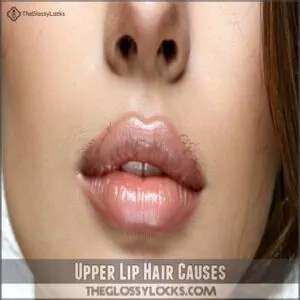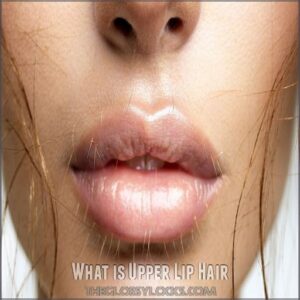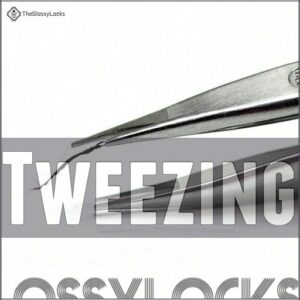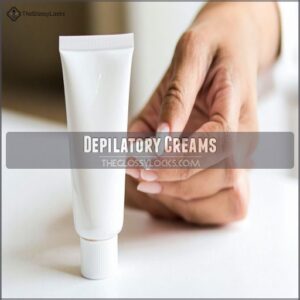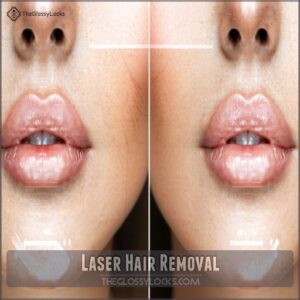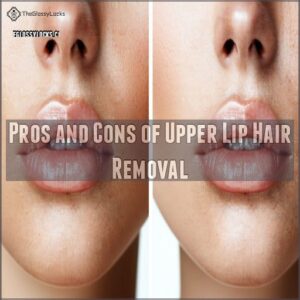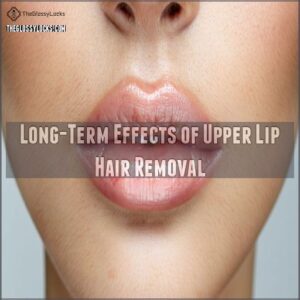This site is supported by our readers. We may earn a commission, at no cost to you, if you purchase through links.
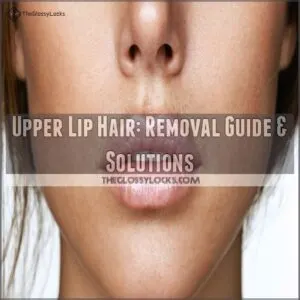 You’re not alone in dealing with upper lip hair – it’s a natural occurrence affecting most women.
You’re not alone in dealing with upper lip hair – it’s a natural occurrence affecting most women.
While genetics and hormones primarily influence its growth, you’ve got plenty of removal options at your fingertips.
From quick fixes like waxing and threading to longer-lasting solutions such as laser treatment, you can choose what works best for your lifestyle and comfort level.
Some methods you can tackle at home, while others require professional expertise.
The key is finding your perfect match among temporary and permanent solutions, considering factors like pain tolerance, budget, and time commitment.
The secret lies in understanding which method suits your unique needs.
Table Of Contents
- Key Takeaways
- Upper Lip Hair Causes
- What is Upper Lip Hair
- Upper Lip Hair Removal Options
- Pros and Cons of Upper Lip Hair Removal
- Natural Remedies for Upper Lip Hair
- Managing Excessive Upper Lip Hair
- Is There a Permanent Upper Lip Hair Solution
- Upper Lip Hair Removal Tools and Techniques
- Preventing Upper Lip Hair Regrowth
- Long-Term Effects of Upper Lip Hair Removal
- Frequently Asked Questions (FAQs)
- Is it normal to have hair on your upper lip?
- How do I stop my upper lip from growing hair?
- What is hair on upper lip called?
- Is it good to shave upper lip hair?
- How soon after pregnancy can I remove facial hair?
- Does upper lip hair removal affect makeup application?
- Which method works best for sensitive, acne-prone skin?
- Can teenagers safely remove upper lip hair?
- Should I remove upper lip hair before special events?
- Conclusion
Key Takeaways
- You’re not alone – upper lip hair is common in women and primarily influenced by genetics and hormones, including conditions like PCOS and hormonal changes during pregnancy or menopause.
- You’ve got multiple removal options to choose from – including temporary solutions like shaving, waxing, and threading, as well as permanent options like laser treatment and electrolysis.
- You can try natural remedies at home – ingredients like turmeric, honey, and sugar can help with hair removal, though results may vary and take longer than conventional methods.
- You’ll need to consider your skin type and sensitivity when choosing a method – some options may cause irritation, ingrown hairs, or other side effects, so it’s important to patch test and start gently.
Upper Lip Hair Causes
Understanding what causes upper lip hair can help you address it effectively, whether it’s due to hormones, genetics, or lifestyle choices.
Recognizing these factors allows you to choose the best removal method or consult a specialist if needed.
Hormonal Influence
Hormonal changes can really stir the pot regarding upper lip hair.
Think about pregnancy effects, PCOS impact, or menopause influence.
They’re like unruly houseguests disrupting your facial hair harmony.
Even birth control pills can throw a curveball, ramping up that hair growth.
If hirsutism strikes, it’s another clue that hormones are steering the wheel.
Genetic Factors
Your family’s hair traits might sneakily affect your upper lip hair.
Genetics decide your hair type, thickness, and color.
Think of this as nature’s not-so-subtle nudge.
You can’t fight your genes, but understanding them offers insight into:
- Family history: Spot patterns.
- Hair follicle behavior: Determined by genetics.
- Facial hair growth: Often inherited.
- Genetic predisposition: Your hair’s secret script.
Hirsutism
Facial hair can sneak up on women, often linked to hirsutism—a condition where unwanted hair grows due to hormonal spikes or conditions like PCOS. Picture a hormonal seesaw tipping the wrong way! If you’re dealing with this, seeking a hirsutism diagnosis could clear the air. Explore treatment options to manage and reduce upper lip hair growth subtly and effectively.
| Factor | Detail | Impact |
|---|---|---|
| Hormonal Imbalance | Causes increased hair | Lip hair growth |
| PCOS | Common hirsutism trigger | Unwanted facial hair |
| Genetic Predisposition | Family history influence | Women growing hair |
| Diagnosis Importance | Identifying underlying cause | Effective management |
| Treatment Options | Varies per individual | Hirsutism treatment |
Normal Hair Growth
Every hair has a mind of its own, dancing through growth cycles—anagen, catagen, telogen—before hitting repeat.
It’s like a well-timed symphony, but on your upper lip.
These stages influence lip hair growth patterns and rates.
Hormonal imbalances can also affect this symphony, leading to excessive hair growth in certain areas, such as hair growth around the nipple.
Remember, everyone’s hair growth rate varies due to genetics and age.
Managing this facial hair removal keeps you in control.
Lifestyle Factors
Regarding upper lip hair, lifestyle factors can play a surprising role.
Stress and a poor diet might push those pesky hairs to grow more than usual.
Lack of sleep and certain medications can mess with your hormones, leading to increased hair growth.
By incorporating regular exercise and good skin care, you’re taking control and consulting with dermatologists or estheticians could help too.
What is Upper Lip Hair
You’re probably wondering what’s considered "normal" regarding upper lip hair, and it’s more common than you might think!
This section will clarify what constitutes typical hair growth in this area, and also explore the different types of hair you might experience.
Is It Normal to Have Upper Lip Hair
Tired of dealing with unwanted lip hair? You’re not alone. Upper lip hair is a common dilemma many women face, often leaving them unsure why it’s even there.
Hormonal changes, like those during puberty or with age, can trigger this growth. It’s perfectly normal! Considering it as nature’s peach fuzz, you might find it’s just part of your body’s way of expressing itself—though some wish it wouldn’t.
Whether it’s part of your hormonal symphony or a genetic gift, understanding it can help you choose the best lip hair treatment. After all, control over your appearance means everything.
Types of Upper Lip Hair
Upper lip hair varies widely, embracing its diversity might just set you free. You’ll find a variety of types that signal how to tackle it:
- Hair Texture: From soft "peach fuzz" to coarser, more rebellious strands, texture influences removal methods. Gentle peach fuzz removal may need a softer touch, while coarser hair often requires more robust tactics.
- Hair Color: Blonde hairs can be sneaky, while darker ones demand attention for effective lip hair removal or bleaching.
- Hair Density: Sparse hairs may be less hassle, but denser growth patterns call for more frequent care, ensuring your upper lip stays smooth and lovely.
Upper Lip Hair Removal Options
When considering upper lip hair removal, you have various options ranging from quick fixes to more lasting solutions.
Each method, whether it’s shaving, waxing, threading, or laser treatments, offers unique benefits and potential drawbacks.
To weigh on your path to smooth skin.
Shaving
Thinking about shaving that pesky upper lip hair? It’s quick and painless, leaving your skin smooth and fresh. Grab a small razor, lather up with shaving cream, and follow these tips:
| Shaving Tips | Recommendations |
|---|---|
| Pre-shave prep | Use warm water |
| Razor choice | Small, facial razor |
| Shaving cream | Suitable for sensitive skin |
| Technique | Shave in hair’s direction |
| Post-shave care | Apply soothing moisturizer |
Waxing
Waxing’s allure offers smooth results that can last weeks, but it’s not without its quirks.
Preparation is key:
- Clean the skin to prevent irritation.
- Make sure the hair’s the right length—about a quarter inch.
- Test the temperature; it should be warm, not hot.
- Pull the strip quickly for the best results.
Considerations like waxing pain matter too!
Threading
Threading, a classic art of hair removal, might leave you flinching a bit, but it’s worth every ouch.
This method pulls hair out by the root, offering smoothness that can last for weeks.
Cost-effective and precise, threading works well for small areas like the upper lip.
Unlike waxing, threading avoids skin irritation and is gentler.
In fact, regular threading sessions can help reduce future hair growth.
Here’s a quick comparison:
| Method | Pain Level | Cost |
|---|---|---|
| Threading | Moderate | Low |
| Waxing | High | Moderate |
| Shaving | Low | Very Low |
Threading helps you stay in control of untamed facial hair with each twist and pull.
Tweezing
Tweezing’s a slower, more precise hair removal method than threading.
It’s perfect for tackling those stubborn stray hairs.
Here’s what you need to know:
- Choose tweezers with slanted tips for a better grip.
- Cleanse your skin before tweezing.
- Pull the hair out in the direction of growth.
- Don’t over-tweeze; it can irritate the skin.
Depilatory Creams
Tired of plucking each hair with tweezers?
Try depilatory creams for your lip hair removal needs.
These hair removal products dissolve hair just beneath the skin’s surface, offering longer-lasting results.
While they’re easy to use, watch out for skin irritation or allergic reactions.
Always patch test before using and enjoy smooth skin without the hassle!
Laser Hair Removal
If you’ve tried creams and need something more lasting, laser hair removal is worth considering. It’s a rigorous choice for upper lip hair, targeting dark pigments and offering permanent reduction.
- Costly upfront, but long-term savings.
- Potential risks like skin discoloration.
- Requires 5-7 sessions for best results.
- Maintenance needed for persistent effects.
- Side effects include rare blistering.
Sugaring
Sugaring’s ancient charm lies in its simplicity.
This beauty remedy uses a sugar paste for upper lip hair removal, often gentler than waxing.
Ingredients usually include sugar, lemon, and water.
Pain levels? Lower, as the paste sticks to hair, not skin.
Try it at home for a natural experience!
| Sugaring vs Waxing | Ingredients | Pain Level |
|---|---|---|
| Gentler | Sugar, lemon, water | Lower |
Epilating
Switch from sugaring to epilating for precise upper lip hair removal. Here’s a quick guide to this method:
- Choose Your Epilator: Opt for one with a small head to target the upper lip.
- Manage Pain: Use a numbing cream if you’re sensitive.
- Frequency Matters: Epilate every few weeks for smooth skin.
- Tips for Success: Always exfoliate before use for best results.
Pros and Cons of Upper Lip Hair Removal
When considering upper lip hair removal, weighing the pros and cons of different methods is essential for finding what suits you best.
From quick and easy shaving to precise threading and advanced laser treatments, each option offers unique benefits and challenges.
It’s important to choose wisely based on your needs and lifestyle.
Advantages of Shaving
Shaving offers a cost-effective and quick method for upper lip hair removal.
You get fast results with minimal pain, making it an appealing choice.
Unlike other hair removal methods, shaving is a gentle method that doesn’t go deep, reducing the risk of ingrown hairs.
It’s like an express lane—swift, straightforward, and liberating without a fuss.
Disadvantages of Waxing
Waxing’s not all sunshine and roses, unfortunately. Some downsides include the pain factor—ouch!—especially for those with sensitive skin. You might also experience ingrown hairs, redness, and skin irritation. The cost can add up over time, too.
- Pain
- Ingrown hairs
- Skin irritation
- Redness
Benefits of Threading
Looking for precision in upper lip hair removal? Threading’s a smart choice. It offers detailed work, being effective even for short hairs.
When considering threading for other areas, such as African hair threading, using the right thread for hair threading is important to prevent breakage. Plus, it lasts longer than shaving without the chemical costs of creams. While you might feel a pinch, the results are worth it.
Cost, Precision, Pain
| Precision | Cost | Pain |
|---|---|---|
| High | Moderate | Moderate |
| Effective | Cheaper | Short-term |
| Accurate | Affordable | Slight |
Risks of Depilatory Creams
Depilatory creams might seem like magic wands for hair removal, but they come with baggage.
Skin irritation and allergic reactions are common, especially if you’ve got sensitive skin.
A not-so-lovely chemical burn or strong odor might sneak up on you, too.
Considering your hair removal options, remember that long-term effects vary across skin types.
Choose wisely!
Effectiveness of Laser Hair Removal
After considering depilatory creams’ annoyances, laser hair removal steps in.
It provides long-lasting results by reducing hair growth, but doesn’t guarantee complete permanence.
Here are three things to mull over:
- Cost: Pricey upfront, but saves in the long run.
- Safety: Generally safe, with rare side effects.
- Maintenance: Occasional touch-ups needed.
Explore laser hair removal for freedom from constant upkeep.
Natural Remedies for Upper Lip Hair
When you want to tackle upper lip hair naturally, a bit of kitchen magic can do the trick.
From turmeric pastes to honey mixtures, these remedies offer a gentle alternative without stepping outside your home.
Turmeric and Milk
Turmeric and milk offer a natural remedy for upper lip hair.
Mix these two pantry staples into a paste, applying it like a homemade spa treatment.
Let it dry, then gently rub off to remove hair.
Though results vary, this method combines the soothing properties of milk and turmeric’s reputed hair-inhibiting benefits.
Always patch test for potential side effects.
Gelatin
Got a bit of turmeric dust on you? How about trying a gelatin mask next? A DIY hair removal treat, gelatin is like nature’s own peel-off strip. It mightn’t snatch the roots, but it’s great for a quick upper lip hair fix. Plus, it’s a skin-friendly home remedy.
Remember:
- Easy DIY setup
- Gentle on skin
- Temporary hair removal
Spearmint Tea
Some women swear by spearmint tea for taming unwanted facial fuzz.
Studies suggest it might help curb hair growth, especially if you have hirsutism (excessive hair growth).
You can find spearmint tea products online, such as those specifically marketed as spearmint tea for women.
However, more research is needed.
Don’t expect miracles, but regular sipping might offer a little help.
Remember, everyone’s different, so your results may vary.
The spearmint tea taste is pleasant, too!
A simple spearmint tea recipe involves steeping fresh or dried leaves.
Be mindful of potential spearmint tea side effects like mild stomach upset.
Honey
Switching from spearmint tea to honey, you enter a world where this sweet remedy isn’t just for toast.
Applying honey to your upper lip can give hair removal a sticky twist.
Mix it with lemon juice for added bleaching benefits.
But be cautious—lemon can sting.
Exploring these beauty remedies adds a natural flair to your skincare routine.
Egg White
After honey’s sweet hair removal trick, let’s chat about egg white masks.
A natural way to tackle pesky upper lip hair, egg whites tighten skin and grip hair for easy DIY hair removal.
Whisk an egg white, apply, and let it dry.
Peel it off against hair growth, and voilà—smoother lips!
It’s a staple in natural remedies.
Sugar
Step into the sweet side of skincare with sugaring, a gentle hair removal method.
Combining sugar, lemon, and water creates a paste that captures hairs like a sticky trap.
This technique pulls hair from the root, ensuring smooth results minus the pain of waxing.
Embrace this natural alternative for a skincare routine that’s kind to your skin and your pocket.
Yogurt
Moving from sugar to yogurt, this creamy concoction may surprise you as a home remedy for upper lip hair.
Here’s how to make a DIY yogurt mask:
- Mix yogurt with a pinch of turmeric.
- Apply to the upper lip, allowing it to dry.
- Gently rub off with damp fingers.
Enjoy smoother skin with this natural combo!
Managing Excessive Upper Lip Hair
If you’re struggling with excessive upper lip hair, consider addressing potential underlying causes like medical conditions or hormonal imbalances.
Sometimes, simple lifestyle changes and dietary adjustments can help, but don’t hesitate to explore professional treatments for effective solutions.
Medical Conditions
Your upper lip hair might be a symptom of an underlying medical condition, and it’s also possible that it could be hereditary due to genetic factors involved.
PCOS (Polycystic ovary syndrome), for example, often causes excessive hair growth due to hormonal imbalances.
Other culprits include thyroid issues and hyperandrogenism.
If you’re noticing more hair than usual, don’t panic—see a dermatologist.
They can diagnose the cause and create a plan.
Early detection is key!
Medication
Medication can be a game-changer when tackling excessive upper lip hair.
Some treatments focus on reducing hair growth:
- Prescription options: Medications like Eflornithine can slow hair growth.
- Hair inhibitors: These creams can help manage regrowth.
- Dermatologist consultation: Essential for choosing the right approach.
Remember, always discuss potential medication side effects with your doctor.
Hormonal Imbalance
Hormonal imbalance can feel like walking a tightrope—whether it’s PCOS, thyroid issues, or stress hitting you from the sidelines.
Women growing upper lip hair often see shifts during menopause, leading to more hair.
Consider over-the-counter creams like Eflornithine for lip hair removal, tackling this annoyance head-on.
It’s about reclaiming control, one hair at a time.
Lifestyle Changes
Stress wreaks havoc on hormones, leading to unwanted hair. Feeling overwhelmed? Try these lifestyle changes to regain control:
- Stress Management: Incorporate meditation or yoga to find your zen and promote hormonal balance.
- Exercise Routine: Regular physical activity can keep hormones in check and enhance well-being.
- Sleep Quality: Prioritize sleep; it’s essential for balanced hormones and refreshed mornings.
Dietary Considerations
Aiming for smooth skin? Look at your plate, not just your razor.
Your diet impacts hair regrowth; think about balancing hormones with healthy fats and iron-rich foods.
Also, check for food sensitivities. Sometimes, a simple vitamin deficiency could be the culprit.
These dietary considerations might just be the secret weapon your dermatologist wished you’d try first.
Professional Treatments
When you’re considering professional treatments for upper lip hair, the options range from laser hair removal to electrolysis, each with its own price tag and results.
Waxing and threading remain popular, though dermaplaning offers a unique touch.
Before you make a decision, weigh the cost, read reviews, and understand the potential risks involved to make the best choice for you.
Is There a Permanent Upper Lip Hair Solution
If you’re seeking a permanent solution to upper lip hair, electrolysis might be your best bet, as it uses electrical currents to destroy hair follicles for good.
While it’s effective, keep in mind that it requires multiple sessions and can be pricier than other methods.
Electrolysis
Thinking about electrolysis for that pesky upper lip hair?
It’s a permanent hair removal method that uses tiny needles to destroy hair follicles.
Electrolysis cost varies, but it’s often more affordable than laser treatments in the long run.
You might feel some discomfort—Electrolysis pain levels are generally mild to moderate—but it’s manageable.
Electrolysis side effects are rare, but potential issues include minor skin irritation or scarring.
Electrolysis vs. laser is a common question; electrolysis works on all hair colors, unlike laser, which struggles with lighter shades.
Electrolysis recovery time is quick, typically just a day or two.
Remember to consult a professional for a personalized plan.
Before you book, weigh the electrolysis cost against other hair removal methods.
Doing your homework pays off!
Long-Term Results
Securing long-term results for upper lip hair removal feels like striking gold. Electrolysis and laser hair removal offer more freedom, but each has its quirks. Electrolysis is the go-to for permanent solutions, working on any hair type. Another option, such as using the best epilators for face, can also provide longer-lasting smoothness. Laser hair removal promises hair reduction, especially for darker hair, but it’s not a one-size-fits-all. Be prepared for multiple sessions, and consider ongoing maintenance to keep regrowth at bay.
- Electrolysis: Works for all hair types
- Laser Hair Removal: Best for dark hair
- Long-Term Effects: Reduction, not always absence
- Hair Removal Maintenance: Ongoing care needed
- Dermaplaning: Smooth, not permanent
Upper Lip Hair Removal Tools and Techniques
You’ll find a range of effective tools for upper lip hair removal, from simple razors and tweezers to more advanced options like epilators and threading tools.
Whether you’re looking for a quick fix or longer-lasting results, you can choose the method that works best for your skin type and comfort level.
Razors
You’ll find razors designed specifically for upper lip hair removal come in various types.
Small, precise facial razors offer better control than standard razors, helping you navigate the contours of your upper lip.
For best results, use a fresh blade and gentle, downward strokes.
Electric facial trimmers provide a safer alternative, especially if you’re prone to nicks or have sensitive skin.
Waxing Strips
Ready-to-use waxing strips are your go-to solution for quick and effective upper lip hair removal at home.
They’re pre-coated with wax and come in sizes perfect for targeting that delicate area above your lip.
- Always warm the strips between your palms for 30 seconds to activate the wax
- Apply in the direction of hair growth, then pull swiftly against it
- Keep post-wax soothing oil handy to calm any redness
Threading Tools
Threading tools transform your upper lip hair removal routine into a precise art.
You’ll need cotton thread, a good mirror, and proper lighting to get started.
Here’s what different threading tools offer:
| Tool Type | Effectiveness | Best For |
|---|---|---|
| Cotton Thread | High | Daily use |
| Polyester Thread | Medium | Travel |
| Spring Tool | Medium-High | Beginners |
| Threading Machine | High | Professionals |
| Handheld Threader | Medium | Quick touch-ups |
Tweezers
Like a precise surgical tool, tweezers are your faithful companion in the battle against upper lip hair.
Tweeze after a warm shower when pores are open and hair is softer.
Choose tweezers with slanted tips that grip even the finest hairs.
Clean your tweezers with alcohol between uses to prevent bacteria buildup and maintain their grip strength.
Epilators
While tweezers target individual hairs, epilators pack more punch by removing multiple hairs simultaneously from your upper lip.
Think of it as a fast-forward version of tweezing.
Here’s what you’ll want to know about using an epilator:
- Start with clean, exfoliated skin to prevent ingrown hairs
- Choose a facial epilator with smaller heads for precision
- Use gentle, circular motions against hair growth
- Apply a soothing gel afterward to calm redness
The initial sting might make you wince, but you’ll get smoother results that last 3-4 weeks.
Preventing Upper Lip Hair Regrowth
You’ll find that managing upper lip hair regrowth requires a consistent routine of proper hair removal techniques and skin care.
While you can’t stop hair from growing back completely, you can slow its return and maintain smoother skin by combining regular exfoliation with your preferred removal method.
Maintenance Routine
Maintaining your upper lip’s smoothness isn’t just about removal – it’s about creating a routine that works for you.
Here’s a schedule that’ll keep your skin happy and hair-free:
| Timeframe | At-Home Care | Professional Care |
|---|---|---|
| Weekly | Gentle cleansing | Threading touch-up |
| Monthly | Hair removal | Waxing session |
| Quarterly | Skin assessment | Laser treatment |
Remember to moisturize daily and avoid harsh products between treatments to prevent irritation.
Exfoliation
Between hair removal sessions, gentle exfoliation helps prevent ingrown hairs and keeps your upper lip smooth.
You’ll want to use a soft facial scrub or exfoliating mitt twice weekly, focusing on circular motions.
Skip harsh scrubs – they’ll only irritate sensitive skin.
For best results after waxing or threading, wait 24 hours before exfoliating to avoid inflammation.
Stay consistent with your routine.
Skin Care
Proper skin care acts as your shield against irritation after upper lip hair removal.
You’ll want to keep your skin hydrated with alcohol-free moisturizers, or try aloe vera products and use gentle, fragrance-free products suited to your skin type.
Apply a soothing aloe vera gel or chamomile-based cream to calm any redness.
Remember to protect treated areas from sun exposure with SPF 30+ sunscreen to prevent hyperpigmentation.
Hair Removal Frequency
Your hair removal timing depends on your chosen method and growth cycle.
For waxing and threading, schedule appointments every 4-6 weeks when hair reaches 1/4 inch.
If you’re using depilatory creams, plan for every 1-2 weeks.
Daily or every other day works best for shaving.
Remember, everyone’s hair grows at different rates, so adjust your schedule based on what you notice works for your upper lip.
Long-Term Effects of Upper Lip Hair Removal
You’ll need to think about how your chosen hair removal method affects your skin and hair growth patterns over time, as some techniques can lead to ingrown hairs or skin sensitivity.
While methods like shaving offer quick results with minimal side effects, longer-term solutions such as laser treatments might cause lasting changes to your hair’s thickness and growth rate.
Skin Irritation
Persistent skin irritation from upper lip hair removal can feel like a frustrating battle.
You’ll likely notice redness, sensitivity, or mild burning immediately after treatment, especially with waxing or depilatory creams.
For severe irritation, consider using products to soothe irritated skin.
While these reactions typically subside within 24 hours, some people experience prolonged sensitivity.
To minimize irritation, always patch test new products and consider switching to gentler methods if your skin remains reactive.
Ingrown Hairs
Ingrown hairs can turn your smooth upper lip into a battleground when hair follicles curl back into the skin.
While they’re more common with shaving, any hair removal method can cause these pesky bumps.
To prevent them, always exfoliate gently before hair removal, use sharp tools, and follow the direction of hair growth.
For existing ingrowns, try a warm compress and avoid picking at them.
Hair Regrowth
Hair regrowth varies based on your chosen removal method.
After shaving, you’ll notice stubble within 1-2 days, while waxing or threading results last 4-6 weeks.
Laser treatment gradually reduces regrowth over multiple sessions.
Hair often grows back finer after repeated waxing, though this isn’t permanent.
For consistent results, maintain a regular removal schedule that matches your chosen method’s regrowth timeline.
Permanent Damage
Through repeated harsh treatments, your upper lip skin might experience lasting changes.
While rare, aggressive hair removal can lead to skin discoloration, especially from laser treatments or chemical burns from depilatory creams.
Scarring may occur from electrolysis gone wrong, and damaged hair follicles could cause patchy regrowth.
The good news? These risks are minimal when you stick to gentle methods and follow proper techniques.
Frequently Asked Questions (FAQs)
Is it normal to have hair on your upper lip?
Ever wondered if those tiny strands make you unique?
Facial hair growth is completely normal – whether light or dark.
You’re not alone, as most people have some degree of natural hair growth.
How do I stop my upper lip from growing hair?
While you can’t completely stop growth, you’ve got options: try laser treatment for permanent results, waxing for longer-lasting effects, or quick fixes like shaving and depilatory creams for temporary removal.
What is hair on upper lip called?
Hair above your upper lip is called mustache in men and peach fuzz in women.
For those seeking professional terms, it’s also known as vellus hair or terminal hair, depending on its thickness.
Is it good to shave upper lip hair?
Shaving is a quick, painless option that won’t make your hair grow back thicker.
It’s gentle on sensitive skin and provides immediate results.
You’ll need to maintain it every few days for smoothness.
How soon after pregnancy can I remove facial hair?
During pregnancy, nearly 40% of women experience increased facial hair growth.
You can safely resume most hair removal methods 6-8 weeks postpartum, but consult your doctor first, especially for chemical treatments or laser procedures.
Does upper lip hair removal affect makeup application?
Removing facial fuzz creates a smoother canvas for makeup, preventing foundation from appearing patchy or uneven.
You’ll notice better coverage and a more polished finish, plus your products won’t cling to unwanted hair.
Which method works best for sensitive, acne-prone skin?
For sensitive, acne-prone skin, threading offers the gentlest approach with minimal irritation.
You’ll find it causes less breakouts than waxing or creams, and it’s more precise than shaving.
Consider scheduling monthly sessions.
Can teenagers safely remove upper lip hair?
Like a gentle breeze, teens can safely tackle unwanted hair using mild methods.
Shaving or chemical-free options like threading are good places to start.
Always patch test new products and consult parents first.
Should I remove upper lip hair before special events?
You’ll want to schedule hair removal 2-3 days before your event.
This timing allows any redness to fade while ensuring you’re still smooth.
Choose your preferred method based on skin sensitivity.
Conclusion
Whether you’re dealing with light fuzz or coarse upper lip hair, you’ve got options.
From quick DIY methods to long-term professional treatments, each solution comes with its own set of pros and cons.
Remember, what works for your friend mightn’t work for you.
Take time to experiment with different removal methods, consider your budget and pain tolerance, and don’t hesitate to consult a professional if you’re concerned about excessive growth.
Your perfect upper lip hair solution is out there – it’s just about finding what clicks with your lifestyle.

